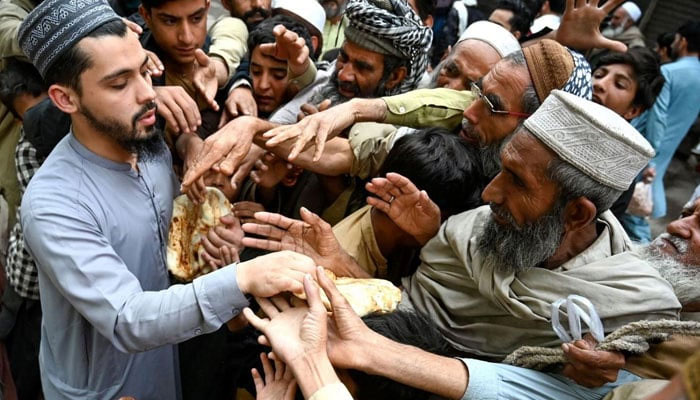Tale of two classes
LAHORE: The hardships faced by ordinary Pakistani citizens have multiplied in recent years, while the luxuries enjoyed by a fortunate few have increased. This disparity is due to a system that favours the elite, despite superficial claims by the state to tax the rich.
The elite in Pakistan can be categorized into four groups. The first group includes top businessmen and their families; next are feudal lords and ruling politicians. Top bureaucrats and members of the judiciary, who enjoy substantial perks, also fall into this elite category. Lastly, smugglers and corrupt individuals live an elitist lifestyle, evading taxes altogether. Addressing these elitist groups is crucial for extricating the country from its current predicament.
While there is no magic wand to improve the economy overnight, even the necessary steps to remove bottlenecks hindering growth have not been taken. We should begin by plugging the leakages within the government and rationalizing the pay and perks of high-ranking government officials and the ruling elite. The leakages in the power and gas sectors are well documented.
Vested interests often attribute these issues to high capacity charges, which is partially true. However, bad governance, corruption and theft cause greater losses than capacity charges. If these inefficiencies are addressed, power rates could be substantially reduced. A well-governed government could save over Rs1 trillion; only strong political will can tackle the vested interests profiting from the current system.
Another major source of leakage at the state level comes from public sector enterprises (PSEs). The losses incurred by unprofitable PSEs are well known, yet even the profitable companies do not generate income comparable to similar private sector firms. For instance, the National Bank of Pakistan earns significantly less than private banks that are half its size. In principle, the government should not be in the business of business; however, privatizing loss-making PSEs could immediately save the state Rs1 trillion a year.
Next, we need austerity in government operations. While disbanding certain departments and reducing the workforce might seem necessary, these measures appear cosmetic. A true austerity programme must address how the government is run. Banning refreshments and limiting foreign trips will not suffice; we must drastically reduce the fleet of government-owned cars, which consume approximately Rs1 trillion in fuel. The concept of free electricity likely exists only in Pakistan. This practice should end immediately. The ruling elite, government employees and judiciary members enjoy free electricity, and some retain these perks long after retirement. They were adequately compensated during their service, but the entitlement to such luxuries is unheard of elsewhere in the world.
Combating smuggling and taxing tax evaders could contribute over Rs1 trillion to the national treasury. By implementing these measures, we could potentially save Rs4 trillion, significantly reducing our budget deficit. If the government can put its house in order, it will be easier to bring other elite groups into the tax net.
The economy is the primary issue facing the country. Ordinary Pakistanis understand that Pakistan is a poor nation, where most struggle to make ends meet. Meanwhile, our ruling elite operates with the mindset of managing a wealthy state.
-
 Princess Beatrice, Eugenie Are ‘not Innocent’ In Epstein Drama
Princess Beatrice, Eugenie Are ‘not Innocent’ In Epstein Drama -
 Reese Witherspoon Goes 'boss' Mode On 'Legally Blonde' Prequel
Reese Witherspoon Goes 'boss' Mode On 'Legally Blonde' Prequel -
 Chris Hemsworth And Elsa Pataky Open Up About Raising Their Three Children In Australia
Chris Hemsworth And Elsa Pataky Open Up About Raising Their Three Children In Australia -
 Record Set Straight On King Charles’ Reason For Financially Supporting Andrew And Not Harry
Record Set Straight On King Charles’ Reason For Financially Supporting Andrew And Not Harry -
 Michael Douglas Breaks Silence On Jack Nicholson's Constant Teasing
Michael Douglas Breaks Silence On Jack Nicholson's Constant Teasing -
 How Prince Edward Was ‘bullied’ By Brother Andrew Mountbatten Windsor
How Prince Edward Was ‘bullied’ By Brother Andrew Mountbatten Windsor -
 'Kryptonite' Singer Brad Arnold Loses Battle With Cancer
'Kryptonite' Singer Brad Arnold Loses Battle With Cancer -
 Gabourey Sidibe Gets Candid About Balancing Motherhood And Career
Gabourey Sidibe Gets Candid About Balancing Motherhood And Career -
 Katherine Schwarzenegger Shares Sweet Detail From Early Romance Days With Chris Pratt
Katherine Schwarzenegger Shares Sweet Detail From Early Romance Days With Chris Pratt -
 Jennifer Hudson Gets Candid About Kelly Clarkson Calling It Day From Her Show
Jennifer Hudson Gets Candid About Kelly Clarkson Calling It Day From Her Show -
 Princess Diana, Sarah Ferguson Intense Rivalry Laid Bare
Princess Diana, Sarah Ferguson Intense Rivalry Laid Bare -
 Shamed Andrew Was With Jeffrey Epstein Night Of Virginia Giuffre Assault
Shamed Andrew Was With Jeffrey Epstein Night Of Virginia Giuffre Assault -
 Shamed Andrew’s Finances Predicted As King ‘will Not Leave Him Alone’
Shamed Andrew’s Finances Predicted As King ‘will Not Leave Him Alone’ -
 Expert Reveals Sarah Ferguson’s Tendencies After Reckless Behavior Over Eugenie ‘comes Home To Roost’
Expert Reveals Sarah Ferguson’s Tendencies After Reckless Behavior Over Eugenie ‘comes Home To Roost’ -
 Bad Bunny Faces Major Rumour About Personal Life Ahead Of Super Bowl Performance
Bad Bunny Faces Major Rumour About Personal Life Ahead Of Super Bowl Performance -
 Sarah Ferguson’s Links To Jeffrey Epstein Get More Entangled As Expert Talks Of A Testimony Call
Sarah Ferguson’s Links To Jeffrey Epstein Get More Entangled As Expert Talks Of A Testimony Call




